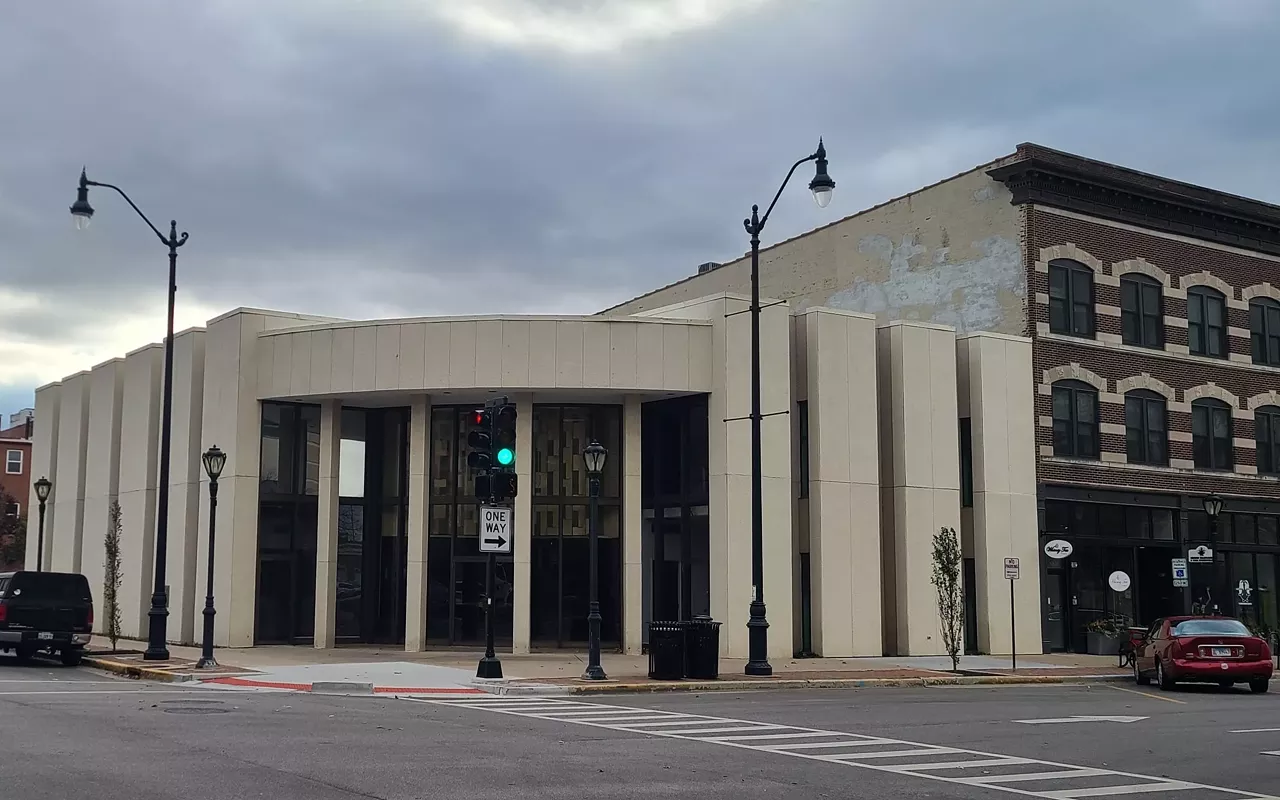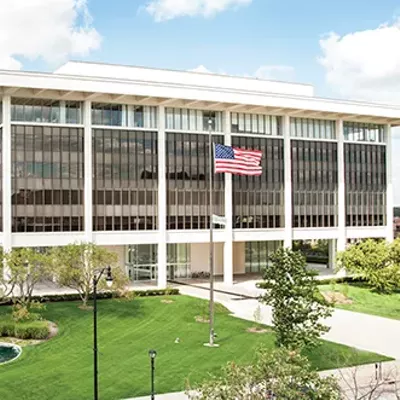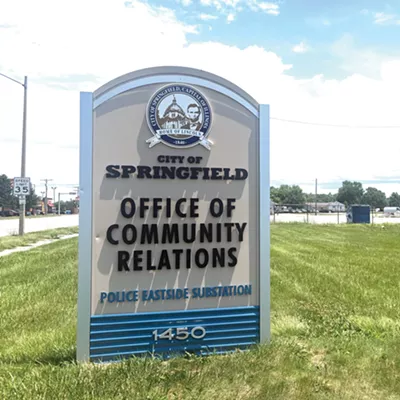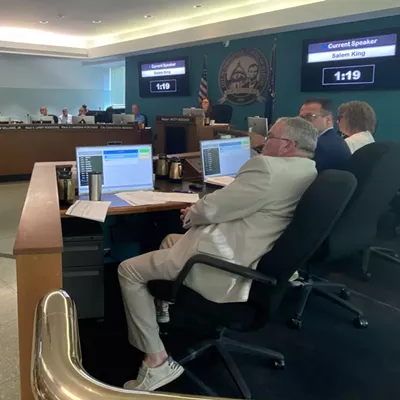
The Springfield City Council voted 8-0 on Feb. 4 to spend about $1.5 million in TIF funds to help a local couple renovate a dilapidated building in the 300 block of East Adams Street.
But the Ward 5 representative on the council, Lakeisha Purchase, who has worked with Martin and Laurie Haxel for two years on the project at 322 E. Adams St. as part of Purchase’s efforts to revitalize downtown, abstained from voting on the measure or taking part in debate.
Purchase did so upon the advice of Gregory Moredock, the city’s chief counsel. Moredock said state law governing tax-increment financing districts, such as Springfield’s Central Area TIF, prohibits an alderperson who owns property in a TIF, as Purchase does, from voting or taking part in debate on matters affecting that specific TIF.
Moredock’s legal opinion surprised many on the council because it appeared to be unprecedented in Springfield city government.
The council has taken votes to create TIFs and spend money from those TIFs to support projects in them for decades. The funds are generated by the incremental increase in property taxes collected since their inception. But it appears that alderpersons never before were told to abstain if they owned a home within the boundaries of a TIF or owned other property there.
“I was surprised,” said Purchase, the Ward 5 alderperson since September 2021. She has owned property in the Central Area TIF for a year and also owns property in the Enos Park TIF, where she lives.
She has voted numerous times on ordinances dealing with TIF projects in her ward, both during the administration of Mayor Misty Buscher and former mayor Jim Langfelder, whom Buscher defeated in 2023 in Langfelder’s quest for a third consecutive term.
“No one said a word,” Purchase said.
Purchase wasn’t the only one who was surprised by Moredock’s legal opinion. Ward 3 Ald. Roy Williams Jr. said the home he owns and lives in is in the Far East Side TIF. He said he has voted on issues involving that TIF, including funding for the recently completed Poplar Place rental housing development.
And former Ward 7 Ald. Joe McMenamin, a lawyer, has owned a downtown three-story apartment building in the 400 block of East Washington Street in the Central Area TIF since mid-2020.
McMenamin said he voted on issues involving that TIF and was never instructed to abstain by former Springfield Corporation Counsel Jim Zerkle and other lawyers advising the City Council during his tenure as an alderperson, which ended in 2023.
Moredock, who was hired by the city shortly after Buscher took office, said he “became aware” of Purchase’s ownership of property in the downtown TIF as an ordinance for the Haxel’s project was being proposed. He wouldn’t say how he became aware of Purchase’s situation.
He said he then researched Illinois’ TIF law, which was first enacted in the 1980s.
Moredock said his reading of the law led to his opinion that elected officials on the council who own property in a TIF shouldn’t take part in debate or votes on that TIF. He didn’t fault Purchase for not being aware of the potential conflict.
One exception, he said, is a primary residence in a TIF established before Dec. 31, 1989. The downtown TIF is the only one in Springfield that was formed before that date. A council member whose primary home is in the downtown TIF wouldn’t have to abstain, Moredock said.
The law includes provisions to prevent elected officials from voting on issues that could personally benefit themselves. Williams, however, said Moredock’s legal opinion appears to be unfair to alderpersons trying to advocate on behalf of their wards. Williams said almost all TIF votes are unlikely to directly benefit council members.
Purchase said the legal opinion could hamstring her efforts on behalf of downtown development.
Community activist Ken Pacha, who frequently addresses the council during public comment periods, has suggested that the city, using its home-rule authority, could adopt an ordinance to supersede state law and explicitly allow alderpersons to vote on and debate TIF issues even if they own property in a particular TIF.
Moredock said he would be happy to look into whether that option is possible, if the council desires.
Moredock said he will work with City Clerk Chuck Redpath to make sure that economic interest forms filed by council members with the clerk each year by May 1 are updated with requirements that they list all of their property interests. That way, Moredock said he can give the council more consistent and clear legal advice.
McMenamin didn’t disagree with Moredock’s opinion and said he would have abstained from votes in the past if requested.
Moredock said the TIF law doesn’t invalidate votes or entire TIFs if a council member voted when he or she perhaps shouldn’t have. He said he doesn’t know of any previous legal cases in Illinois that have challenged TIF-related votes based on an elected official’s property ownership.
Former mayor Langfelder, reached by phone, said he wasn’t aware of Moredock’s legal interpretation and said Zerkle, who served during Langfelder’s administration, never raised the issue.
However, Langfelder said boundaries for the Peoria Road TIF were drawn in 2017 specifically to exclude Fulgenzi’s Pizza and Pasta, 1168 E. Sangamon Ave., so that TIF wouldn’t create a conflict of interest for former Ward 4 Ald. John Fulgenzi.
“We always advised council members to refrain from voting on any ordinance whenever there was a financial conflict of interest from a personal or business side,” Langfelder said.
Steven Mahrt, a Bloomington-based municipal-law specialist with the Chicago-based law firm Ancel Glink, said Moredock’s legal opinion is “generally correct.”
Kathleen Field Orr, a municipal-law specialist based in Homewood, said excluding elected officials from voting on a TIF issue when only their home is in a TIF, and not any other property, is a “conservative position on the law.”
Potential conflict-of-interest issues involving TIFs and local elected officials generally are addressed when boundaries are set for TIFs, Mahrt said. After that, municipal lawyers generally don’t look into potential conflicts unless a complaint or concern is raised, because lawyers may not know elected officials’ addresses, he said.
The TIF law is “pretty involved” and “quite convoluted,” Mahrt said. “I can see how an oversight could happen.”













